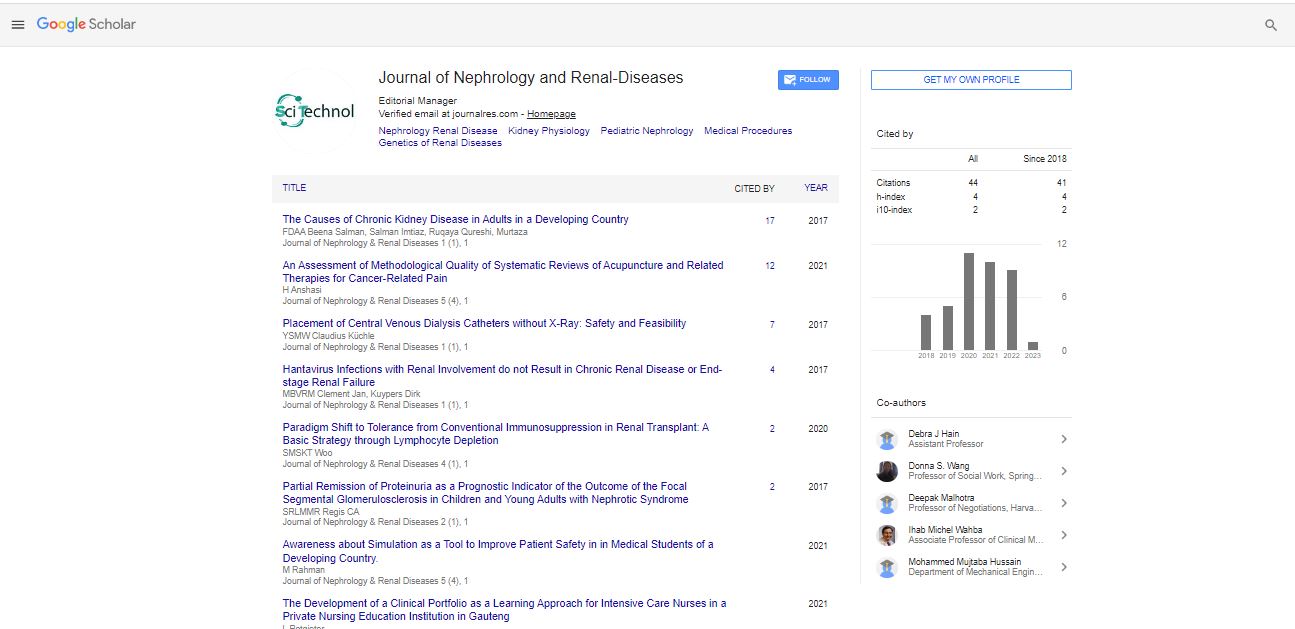Perspective, J Nephrol Ren Dis Vol: 7 Issue: 3
The Perilous Intersection of Chronic Kidney Disease and Cardiovascular Health
Nianli Bella*
1Department of Nephrology, Amsterdam University Medical Center, Amsterdam, Netherlands
*Corresponding Author: Nianli Bella,
Department of Nephrology, Amsterdam
University Medical Center, Amsterdam, Netherlands
E-mail: bella.n@amsterdamumc.nl
Received date: 28 August, 2023, Manuscript No. JNRD-23-117618;
Editor assigned date: 30 August, 2023, PreQC No. JNRD-23-117618 (PQ);
Reviewed date: 13 September, 2023, QC No. JNRD-23-117618;
Revised date: 21 September, 2023, Manuscript No. JNRD-23-117618 (R);
Published date: 29 September, 2023, DOI: 10.4172/2576-3962.1000039
Citation: Bella N (2023) The Perilous Intersection of Chronic Kidney Disease and Cardiovascular Health. J Nephrol Ren Dis 7:3.
Description
Chronic Kidney Disease is often referred to as the "silent epidemic" due to its insidious progression. It is characterized by the gradual loss of kidney function over an extended period, often going unnoticed until the disease has reached an advanced stage. CKD can be caused by various factors, including diabetes, hypertension, and primary kidney diseases, with diabetes being one of the leading causes. As CKD progresses, it leads to a range of complications, with cardiovascular health being one of the most significant concerns. Chronic Kidney Disease (CKD) and cardiovascular disease are two of the most significant health concerns facing humanity today. CKD is a silent and progressive condition that affects the kidneys' ability to function properly, while cardiovascular diseases encompass a range of disorders that affect the heart and blood vessels. The relationship between these two conditions is not only dangerous but also complex, creating a health crisis that necessitates a comprehensive understanding and approach. The pathophysiology of CKD involves a series of changes within the kidneys. Initially, the disease manifests as damage to the tiny blood vessels and nephrons, the functional units of the kidneys. Over time, this damage impairs the kidneys' ability to filter blood and maintain fluid and electrolyte balance. The kidneys' regulatory functions are essential for overall health, as they control blood pressure, electrolyte levels, and the elimination of waste products from the body. When the kidneys' functionality diminishes, it sets the stage for a cascade of health issues, particularly in the cardiovascular system.
Cardiovascular complications in CKD
Chronic Kidney Disease (CKD) has a profound impact on the cardiovascular system. The relationship between CKD and cardiovascular health is bidirectional. Just as CKD increases the risk of cardiovascular disease, cardiovascular issues can exacerbate CKD progression. Cardiovascular disease can directly harm the kidneys by impairing renal blood flow and causing damage to the nephrons. As CKD progresses, patients are at increased risk of developing a range of cardiovascular complications. CKD often leads to uncontrolled hypertension, as the kidneys play a pivotal role in regulating blood pressure. The heart compensates for increased blood pressure by thickening its muscle, particularly the left ventricle. This condition, known as left ventricular hypertrophy, is associated with an elevated risk of heart failure. CKD is linked to accelerated atherosclerosis, a condition characterized by the hardening and narrowing of arteries due to the buildup of plaque. This increases the risk of heart attacks and stroke. Altered lipid metabolism, including elevated levels of LDL cholesterol and triglycerides, is common in CKD patients, further increasing the risk of cardiovascular disease. The combination of hypertension, left ventricular hypertrophy, and atherosclerosis often leads to congestive heart failure, a condition in which the heart is unable to pump blood effectively. Diabetes is a leading cause of both CKD and cardiovascular disease. Individuals with diabetes are at a higher risk of developing CKD, which, in turn, increases their risk of heart disease. High blood pressure is both a cause and a consequence of CKD. Tobacco use is a modifiable risk factor that can worsen the progression of CKD and increase the likelihood of cardiovascular disease. Elevated cholesterol levels, especially high LDL cholesterol and triglycerides, contribute to both CKD and cardiovascular problems.
Conclusion
The perilous intersection of chronic kidney disease and cardiovascular health is a pressing global health concern. The bidirectional relationship between these conditions results in a vicious cycle of worsening health outcomes, making it essential to address them comprehensively. Preventive measures, including lifestyle modifications, early screening, and management of risk factors, are pivotal in reducing the impact of this dangerous intersection. Furthermore, healthcare providers should adopt an integrated care approach to address the complexities of managing these coexisting conditions. A deep understanding of the pathophysiology, risk factors, and challenges involved in CKD and cardiovascular health is necessary to develop effective strategies that can ultimately improve the quality of life and outcomes for affected individuals.
 Spanish
Spanish  Chinese
Chinese  Russian
Russian  German
German  French
French  Japanese
Japanese  Portuguese
Portuguese  Hindi
Hindi 
